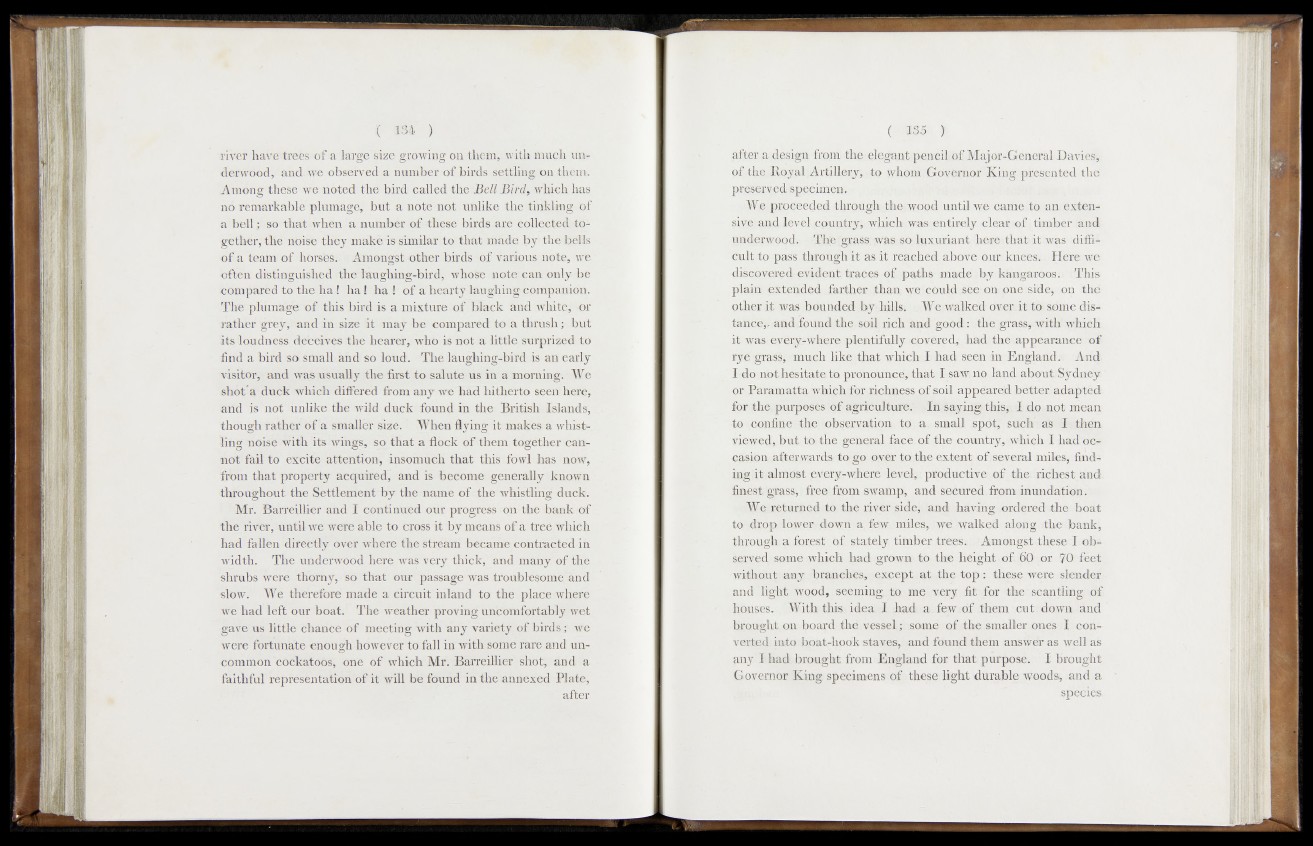
I j g I
riverhavetrees o f a large size growing on them, with much rim-
Norwood, and weofoserveda number of birds settling onthbifr-
Amoig;these we noted: th è bird called 4ke~JBe& Bird, whieh has
no®» markable pfnmagp; but a note not unlike ttfMinklin g-.bf
a bell; so that whein a number ctf-these birds are collected to 1
gether, the noise' they make is similar to that made bylthe-feeds
<0f a team of horsbS:;y Amougsb-other birds o f' varioujgprote, we
<0^behLdMinguished theTanghing-bird; whose, note'cap onlydae
compared to ther hh 1 h a ! ha ! offa^hmrtJdaughing'dPinpaniQn.
The pliiir^fe. of this bind is a mixture of black and white; ‘pc
rathei? tgTè^ji'and ip ®ze it may be compared to a thrush-; but
its loudness debe^ees tthe hearer, who is not a little».-Surprized to
find a lord so small and so loud. The laughing-bird iss an early
visitor, and was usually the first to salute us in a "morning. We
shot a duck which differed from any we had hitherto seen'here,
and is not unlikethe wild duck found in the British Islands; '
fhöügbfa thif of a smaller size. When ilyrngKit makes a whisk-.:
feigmoise With ite wihgsy So that a flock of them; together -cannot
fail to excite attention, insomuch that this fowl has now,
frbta that property acquired, and is become generally known
tltitoUghoUt the ^ ettl^ ö eö ïl^y the-name of-the whistling duck.
Mr. Barreillier and I continued our prepress roh~tbe bank of
the river, until we were able to cross it by means of a tree whiéh
had fallen directly over where the stream became contracted iii
width. The underwood here was very thick, and many*of the
shrubs were thorny, so that our passage was troublesome and
slow. We therefore made a circuit inland to the place where
We had left bur boat. The weather proving uncomfortably-wet
gave1 us little chance of meeting with any variety of birds / we
were fortunate1 enbugh höwever töfall in with some rare and uncommon
cobkaioo», oafe of which Mr. BarreiHier shot, and a
be found in f he annexed Plat®,
u after.
( m y
after a design. from the elegant pencil of Major-General Davies;
ofAh^Pibjal lArtillfty^» to jy h em^Govbrnor King presented the
prc^yg^p-cekabn-. r 1
W;e<^y^eed*e^ mrough the; wood 'unfilwe carpesto axt extensive:
and leveljcppntry,; wfepfcwas entirely ear of timber an d
underwoods fgp$S',;wjas{ so^bjxuriant here th a t it was diffi-
GUl^fo^aS^I&bttghit as i!t rcrtcht%-abbvb1i our knees.. Here:we
diseau^redi-ev^-bnt trace» of.paths made'\by. kangaroos. > ;.This
plain extended farther than; y d could see on-.ppdlsiHej cm the
other if was .bounded ibychills; We walked Oven: ik.to, some dis-
tabcfe^iandifoBndsthej-SQilf rich and geoeh: othe :grass/With which
it • -plentifully dgoyCred^ had the .appearanceiiaf
rybigsra#!,* much like that which .1 had
I do nbtdiesit'ate to proaioun.cdythat I sawi no land about; Sydney'
dfeParamatt%<which for richnes^Q£soil appeared better adapted
JifF the, purposes 'qf agriculture.’ Iii saying this,, I do not mean
to the}»observation' to a. small! Spbtk $tieh as I then
flawed, b u t to»,the general face, of the country, wMch» I had’Oer-
casion .afterwards to, go over teethe extent of, several miles, find-
inghteajmost e^ery-where level, prodnetive of thekriichestand
finest'’grassy free; from swamp, and secured fromdnmxdatioiny
W Re turned do the riverside, and having .ordered .the. boat
1o drop lower-down a, few miles, wc walked along tthe bank,
through; a forest" ;qf stately timber frees«, - Amongst vlhese I observed
some which, had grown to the height ,ofo6(> or 70. feet
withMut: any branches, except at, the top ; these were slender»
andlMight WQod, seeming, to me very fit for the scantling of
houses. . With this id e a ; I .had a . few ,df them cut. down and
brought on board, fkff vessel; .some of the: smaller ones I coh*-
vested into beat-hook staves, nnd found them answer as well as
a n y ! had brought from England, for that purpose. I brought
Governor King specimens- of . these light durable woodsy and a
species